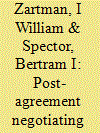| Srl | Item |
| 1 |
ID:
123692


|
|
|
|
|
| Publication |
2013.
|
| Summary/Abstract |
AbstractThis article examines negotiations expected to be conducted during actual implementation after entry-into-force of the Comprehensive Nuclear-Test-Ban Treaty (CTBT). It analyzes the negotiations to be undertaken with regards to on-site inspection (OSI) procedures, and their unique character as post-agreement negotiations (PAN) is identified. In particular, the OSI negotiations will be conducted at the Executive Council (EC) level and will analyze whether violations of the treaty have occurred. This discussion further explores another level of negotiation that will occur during the OSI, between the inspected state and the inspection team, concerning the technical details of implementation. Our analysis demonstrates how these inspection negotiations will likely have an impact, well beyond the OSI itself, on the PAN in the EC regarding OSI, and further on PAN in policymaking organs, and thus on regime evolution.
|
|
|
|
|
|
|
|
|
|
|
|
|
|
|
|
| 2 |
ID:
123693


|
|
|
|
|
| Publication |
2013.
|
| Summary/Abstract |
AbstractEmerging changes to post-agreement negotiation structures and actors can have important implications for the process and outcome of negotiated agreements. These innovations include the coexistence of negotiated global and regional regimes on the same policy issue, as well as civil society organizations that assert their "right to negotiate" at the domestic level to promote national compliance with regime standards and provisions. The evolution of these factors within the post-agreement negotiations of the United Nations Convention Against Corruption (UNCAC) is used as a case study. Globalization and communications technology trends play a major role in promoting these changes.
|
|
|
|
|
|
|
|
|
|
|
|
|
|
|
|
| 3 |
ID:
123688


|
|
|
|
|
| Publication |
2013.
|
| Summary/Abstract |
AbstractThis thematic issue of the journal revisits the thesis introduced ten years ago in the book, Getting It Done: Post-Agreement Negotiation and International Regimes, that regimes are recursive negotiations and not merely one-off settlements that turn next to ratification. Seven cases are presented in the issue and discussed in this article that develop a number of reasons why regimes are marked by post-agreement negotiations. They examine the dimensions of these different types of encounters, all negotiations to be explored by established negotiation analysis but incomplete and incomprehensible without the context of the previous agreement, which then they complement.
|
|
|
|
|
|
|
|
|
|
|
|
|
|
|
|
| 4 |
ID:
123690


|
|
|
|
|
| Publication |
2013.
|
| Summary/Abstract |
AbstractWhen considering the concept of post-agreement negotiations (PAN), the CTBT presents a particularly interesting case, because of its elusive status caused by the unusually long time lag between the treaty's adoption in 1996 and its still unattained entry into force. For almost two decades, negotiations on key elements have been ongoing in the Preparatory Commission (PrepCom) in preparation for entry-into-force as required by the treaty. This article explores the challenges of PAN in the framework of the PrepCom and its place in the CTBT regime evolution. Using four factors in regime development - adjustment, maintenance, cybernetics and exogenous factors - the work of the PrepCom concerning verification is analyzed. Technical and political issues are described as examples from the PrepCom's work since the opening of the CTBT for signature illustrating regime building through post agreement negotiations.
|
|
|
|
|
|
|
|
|
|
|
|
|
|
|
|